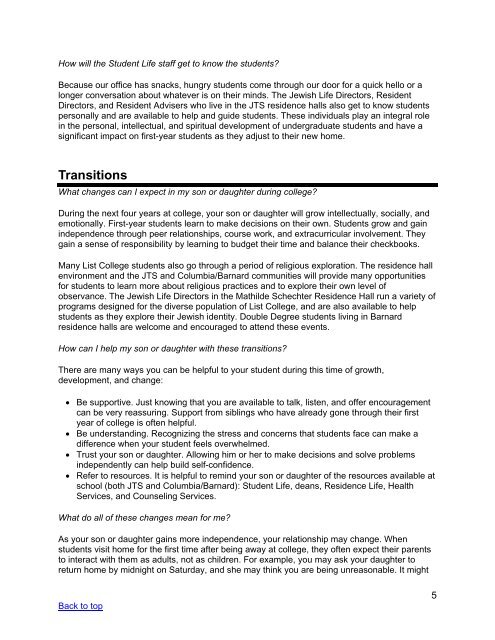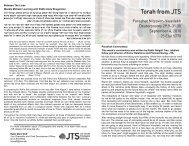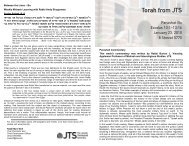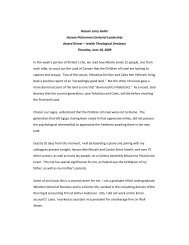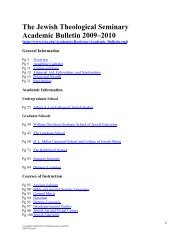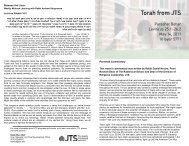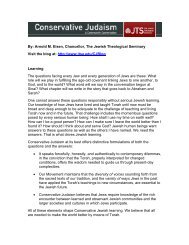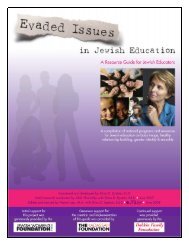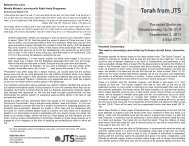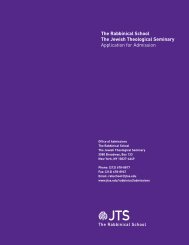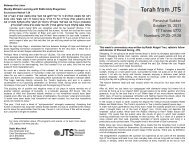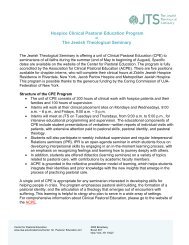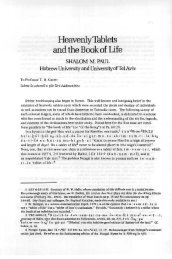Transitions: - The Jewish Theological Seminary
Transitions: - The Jewish Theological Seminary
Transitions: - The Jewish Theological Seminary
You also want an ePaper? Increase the reach of your titles
YUMPU automatically turns print PDFs into web optimized ePapers that Google loves.
How will the Student Life staff get to know the students?<br />
Because our office has snacks, hungry students come through our door for a quick hello or a<br />
longer conversation about whatever is on their minds. <strong>The</strong> <strong>Jewish</strong> Life Directors, Resident<br />
Directors, and Resident Advisers who live in the JTS residence halls also get to know students<br />
personally and are available to help and guide students. <strong>The</strong>se individuals play an integral role<br />
in the personal, intellectual, and spiritual development of undergraduate students and have a<br />
significant impact on first-year students as they adjust to their new home.<br />
<strong>Transitions</strong><br />
What changes can I expect in my son or daughter during college?<br />
During the next four years at college, your son or daughter will grow intellectually, socially, and<br />
emotionally. First-year students learn to make decisions on their own. Students grow and gain<br />
independence through peer relationships, course work, and extracurricular involvement. <strong>The</strong>y<br />
gain a sense of responsibility by learning to budget their time and balance their checkbooks.<br />
Many List College students also go through a period of religious exploration. <strong>The</strong> residence hall<br />
environment and the JTS and Columbia/Barnard communities will provide many opportunities<br />
for students to learn more about religious practices and to explore their own level of<br />
observance. <strong>The</strong> <strong>Jewish</strong> Life Directors in the Mathilde Schechter Residence Hall run a variety of<br />
programs designed for the diverse population of List College, and are also available to help<br />
students as they explore their <strong>Jewish</strong> identity. Double Degree students living in Barnard<br />
residence halls are welcome and encouraged to attend these events.<br />
How can I help my son or daughter with these transitions?<br />
<strong>The</strong>re are many ways you can be helpful to your student during this time of growth,<br />
development, and change:<br />
• Be supportive. Just knowing that you are available to talk, listen, and offer encouragement<br />
can be very reassuring. Support from siblings who have already gone through their first<br />
year of college is often helpful.<br />
• Be understanding. Recognizing the stress and concerns that students face can make a<br />
difference when your student feels overwhelmed.<br />
• Trust your son or daughter. Allowing him or her to make decisions and solve problems<br />
independently can help build self-confidence.<br />
• Refer to resources. It is helpful to remind your son or daughter of the resources available at<br />
school (both JTS and Columbia/Barnard): Student Life, deans, Residence Life, Health<br />
Services, and Counseling Services.<br />
What do all of these changes mean for me?<br />
As your son or daughter gains more independence, your relationship may change. When<br />
students visit home for the first time after being away at college, they often expect their parents<br />
to interact with them as adults, not as children. For example, you may ask your daughter to<br />
return home by midnight on Saturday, and she may think you are being unreasonable. It might<br />
Back to top<br />
5


